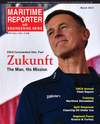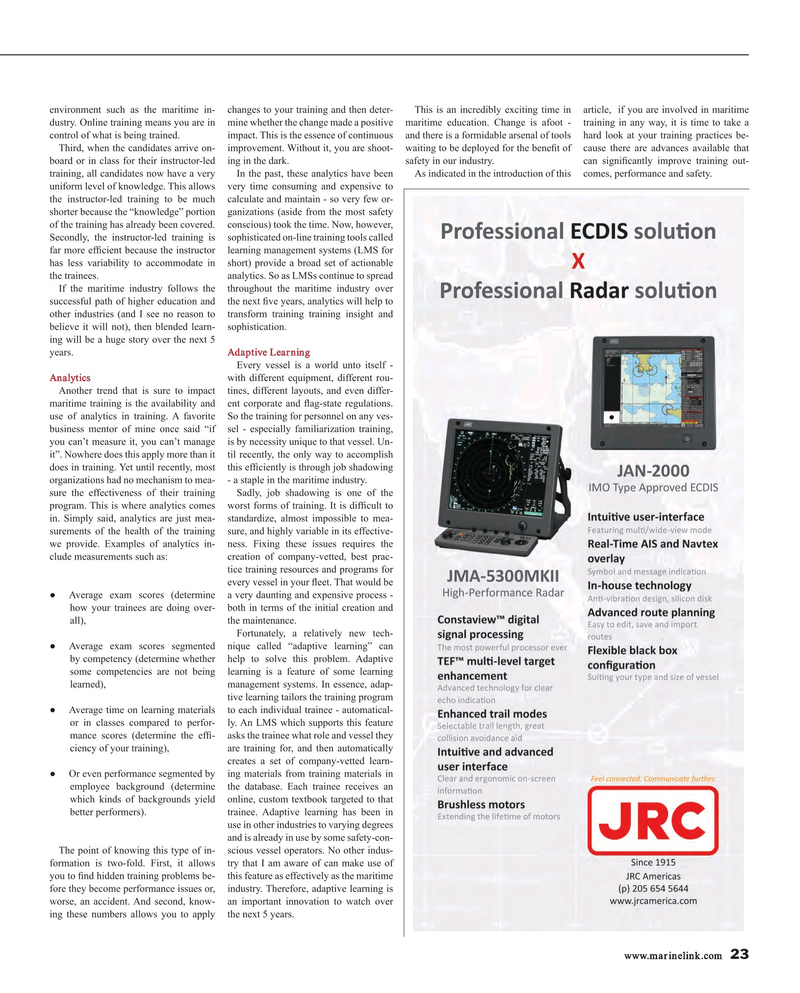
Page 23: of Maritime Reporter Magazine (March 2015)
U.S. Coast Guard Annual
Read this page in Pdf, Flash or Html5 edition of March 2015 Maritime Reporter Magazine
environment such as the maritime in- changes to your training and then deter- This is an incredibly exciting time in article, if you are involved in maritime dustry. Online training means you are in mine whether the change made a positive maritime education. Change is afoot - training in any way, it is time to take a control of what is being trained. impact. This is the essence of continuous and there is a formidable arsenal of tools hard look at your training practices be-
Third, when the candidates arrive on- improvement. Without it, you are shoot- waiting to be deployed for the bene? t of cause there are advances available that board or in class for their instructor-led ing in the dark. safety in our industry. can signi? cantly improve training out- training, all candidates now have a very In the past, these analytics have been As indicated in the introduction of this comes, performance and safety.
uniform level of knowledge. This allows very time consuming and expensive to the instructor-led training to be much calculate and maintain - so very few or- shorter because the “knowledge” portion ganizations (aside from the most safety of the training has already been covered. conscious) took the time. Now, however,
Secondly, the instructor-led training is sophisticated on-line training tools called far more ef? cient because the instructor learning management systems (LMS for has less variability to accommodate in short) provide a broad set of actionable the trainees. analytics. So as LMSs continue to spread
If the maritime industry follows the throughout the maritime industry over successful path of higher education and the next ? ve years, analytics will help to other industries (and I see no reason to transform training training insight and believe it will not), then blended learn- sophistication. ing will be a huge story over the next 5 years. Adaptive Learning
Every vessel is a world unto itself -
Analytics with different equipment, different rou-
Another trend that is sure to impact tines, different layouts, and even differ- maritime training is the availability and ent corporate and ? ag-state regulations. use of analytics in training. A favorite So the training for personnel on any ves- business mentor of mine once said “if sel - especially familiarization training, you can’t measure it, you can’t manage is by necessity unique to that vessel. Un- it”. Nowhere does this apply more than it til recently, the only way to accomplish does in training. Yet until recently, most this ef? ciently is through job shadowing organizations had no mechanism to mea- - a staple in the maritime industry.
sure the effectiveness of their training Sadly, job shadowing is one of the program. This is where analytics comes worst forms of training. It is dif? cult to in. Simply said, analytics are just mea- standardize, almost impossible to mea- surements of the health of the training sure, and highly variable in its effective- we provide. Examples of analytics in- ness. Fixing these issues requires the clude measurements such as: creation of company-vetted, best prac- tice training resources and programs for every vessel in your ? eet. That would be ? Average exam scores (determine a very daunting and expensive process - how your trainees are doing over- both in terms of the initial creation and all), the maintenance.
Fortunately, a relatively new tech- ? Average exam scores segmented nique called “adaptive learning” can by competency (determine whether help to solve this problem. Adaptive some competencies are not being learning is a feature of some learning learned), management systems. In essence, adap- tive learning tailors the training program ? Average time on learning materials to each individual trainee - automatical- or in classes compared to perfor- ly. An LMS which supports this feature mance scores (determine the ef? - asks the trainee what role and vessel they ciency of your training), are training for, and then automatically creates a set of company-vetted learn- ? Or even performance segmented by ing materials from training materials in employee background (determine the database. Each trainee receives an which kinds of backgrounds yield online, custom textbook targeted to that better performers). trainee. Adaptive learning has been in use in other industries to varying degrees and is already in use by some safety-con-
The point of knowing this type of in- scious vessel operators. No other indus- formation is two-fold. First, it allows try that I am aware of can make use of you to ? nd hidden training problems be- this feature as effectively as the maritime fore they become performance issues or, industry. Therefore, adaptive learning is worse, an accident. And second, know- an important innovation to watch over ing these numbers allows you to apply the next 5 years.
www.marinelink.com 23
MR #3 (18-25).indd 23 MR #3 (18-25).indd 23 3/5/2015 2:24:55 PM3/5/2015 2:24:55 PM

 22
22

 24
24
